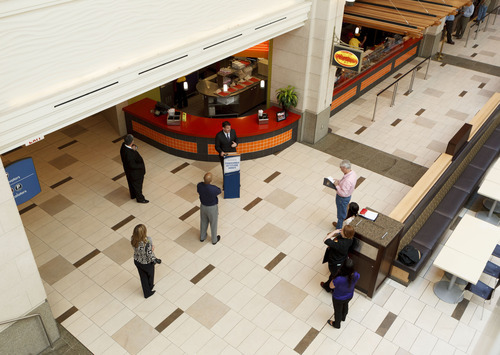This is an archived article that was published on sltrib.com in 2012, and information in the article may be outdated. It is provided only for personal research purposes and may not be reprinted.
If a small fast-food store is a microcosm of the economy, then Taste of Red Iguana is a good place to gauge whether Utahns believe the state is truly recovering from the worst recession since the 1930s.
For two years, Taste of Red Iguana served a reasonably sized lunch crowd of construction workers and people employed in buildings ringing City Creek Center as it slowly emerged from the rubble of the demolished Crossroads and ZCMI shopping malls in downtown Salt Lake City.
"We were getting by nicely with a two-hour lunch crowd. They would eat and then go away," manager Kate Lubing said Tuesday.
That changed March 22 when the 700,000-square-foot center with more than 90 retailers and restaurants opened with a flourish unrivaled since the 2002 Winter Olympics.
What had been a steady stream of lunchtime Joes at Taste of Red Iguana, located in what is now the center's food court, suddenly blossomed into an all-day tidal wave of shoppers hungry for the fast-food version of its famous Red Iguana restaurant parent's signature Mexican menu.
A month later, the surge of diners is "more like rough waves rather than tidal waves,"Lubing said. "But we still see the crowds."
Other than to say sales are up by double-digit amounts and the average check size is up a bit, Lubing won't divulge numbers. But if the number of customers she sees is a barometer of consumer attitudes, then Utahns are a confident lot.
Her assessment was backed up Tuesday by a pair of reports. The confidence of Utah consumers surged in April from the previous month despite rising gasoline prices, while Americans' confidence in the economy held steady, according to the Zions Bank Consumer Attitude Index and the Consumer Confidence Index, respectively.
The Zions index jumped to 85.3, up sharply from 79.9 in March, said Randy Shumway, CEO of The CiceroGroup/Dan Jones and Associates, which prepared the Utah report. April's number is the highest since the index was created in January 2011.
Nationally, the Conference Board said its index is at 69.2, down slightly from a revised 69.5 in March. Economists were expecting a reading of 70, according to a FactSet poll of analysts. The current level is below February's 71.6, which is the highest level it's been in a year.
Consumer confidence is widely watched because consumer spending accounts for 70 percent of economic activity. Nationally, the Consumer Confidence Index is significantly below the 90 reading that indicates a healthy economy. But it's well above its all-time low of 25.3 in February 2009. In Utah, the Zions index is closing in on 90, and Shumway expects more improvement in coming months.
Despite a 16 percent acceleration in gas prices last month, Utah consumers are generally confident about the present state of the economy and becoming bullish about the future, he said.
Over the past six months, consumer confidence in every category measured by the Zions index — price expectations, government performance, personal finance, business conditions and employment — has improved, he said.
"We are seeing the economy slowly but steadily recover, and that's despite the rise in gas prices," Shumway said, noting that Utah's 5.8 percent unemployment rate is 2.4 percentage points lower than the U.S., job growth exceeds the national rate, bankruptcies in Utah are declining and although the Dow Jones industrial average has plateaued recently, the index is up 22 percent since October.
Economists are paying close attention to consumers' behavior because the U.S. economy is at a critical juncture. New reports that show rising layoffs and slowing home sales are raising concerns that the economic recovery is facing a spring slowdown for the third straight year. The stock market rally also has lost steam in recent weeks amid renewed worries about the European financial crisis and the economy at home.
"Overall, consumers are more upbeat about the state of the economy, but they remain cautiously optimistic," said Lynn Franco, director of The Conference Board Consumer Research Center, in a statement.
The Conference Board's report, which is based on a survey conducted from April 1 through April 12 with about 500 randomly selected people nationwide, underscored how Americans' views of the job market remains cautious. The Zions index is based on a random sample of 500 Utah households over a two-week period earlier this month.
Those stating jobs are "hard to get" declined to 37.5 percent from 40.7 percent, while those stating jobs are "plentiful" decreased to 8.4 percent from 9 percent. Americans who are anticipating more jobs in the months ahead declined to 16.9 percent from 17.4 percent.
The lack of confidence comes as the average number of people seeking U.S. unemployment benefits over the past month has risen to a three-month high. According to the April jobs report, employers added 120,000 jobs last month — half the December-February pace and well short of the 210,000 economists were expecting. The national unemployment rate fell from 8.3 percent in February to 8.2 percent in March — the lowest since January 2009 — but that was mainly because many Americans stopped looking for work.
Meanwhile, the home market remains weak, according to the latest data released Tuesday. Sales of new homes fell in March by the largest amount in more than a year, according to the Commerce Department. A widely watched report on home prices showed a drop in February in most major U.S. cities for a sixth straight month, according to Standard & Poor's/Case-Shiller home-price index.
Still, retail sales have been solid. Gas prices also are beginning to fall, after a four-month surge pushed the average to nearly $4 per gallon earlier this month. The price of gasoline in the U.S. has dropped by nearly 8 cents per gallon since the first week of April after a decline in oil prices and gasoline consumption. Gasoline, on average, now costs about as much as it did a year ago.
The Associated Press contributed to this story







